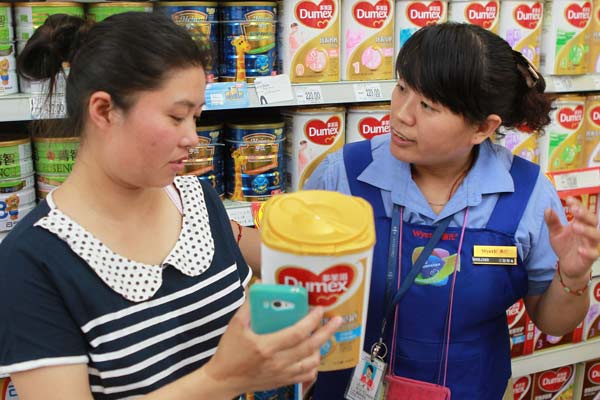New Zealand milk stokes fears
Chinese firms recall products exposed to contamination
Chinese producers who bought contaminated batches of whey protein concentrate from New Zealand were recalling products on Sunday, dealing the latest blow to Chinese consumers' confidence in milk powder products.
Diary giant Fonterra said on Saturday that tests had discovered Clostridium botulinum in its whey protein, which clients buy as raw material to produce baby formula and sports drinks.
 |
|
Mu Liping (left) checks with a saleswoman at a supermarket in Beijing on Sunday whether her newly bought Dumex baby formula should be recalled. Dumex announced it was recalling 12 batches of products in China that may be contaminated. Mu found her purchase didn't belong to the recalled batches and left with the baby power. [Cui Meng / China Daily] |
Clostridium botulinum is one of the world's strongest toxins and can destroy the human nervous system if ingested. In infants under 1 year old, it can trigger neural paralysis.
Chinese consumers are very alert to the quality of dairy products, especially after a series of scandals, including the one in 2008 when at least six children died and about 300,000 were poisoned after being exposed to milk powder tainted with melamine, a toxic chemical.
China's largest beverage producer Hangzhou Wahaha's Health Food Co and its Import and Export Co, as well as infant nutrition company Dumex, and State-owned food producer Shanghai Sugar Cigarette and Wine (Group) Co, were found to have imported contaminated dairy products from Fonterra, the largest dairy business in New Zealand, according to China's top quality watchdog.
Shanghai-based Dumex, which imported more than 208 metric tons of the tainted whey protein concentrate, said on Sunday that 12 batches of its baby formula products had been affected.
"Dumex has started a preventive recall and has destroyed the affected finished products," read a statement on Dumex's website.
Shanghai Sugar Cigarette and Wine (Group) Co said after investigations that the 4.8 tons of products from the New Zealand supplier had been passed on to its client, Coca-Cola Shanghai.
In an online statement, Coca-Cola Greater China said 25 kilograms of the raw materials were used to produce drinks that blend fruits with milk under the portfolio of Minute Maid, and the rest have been isolated.
"Due to the ultra-high temperature sterilization in the process of production, domestic and foreign experts and our researchers agree the batches of beverage products are safe," the statement said. "We are working on tracing the production and shipping records of the affected products and recalling them."
Coca-Cola could not be reached on Sunday to find out the number of affected batches.
Hangzhou Wahaha's Health Food Co and Import and Export Co, which imported nearly 15 tons of tainted whey protein concentrate, said the materials were used to produce Nutri-Express fermented whey drink, which left the factory by February and had almost been sold out.
"We're asking sales staff to check with retailers whether products of this batch are still in the market and we will recall them immediately," the company said on its website. It did not reveal the batch numbers.
However, Wahaha said tests did not find the toxin in the end products, as the bacteria cannot survive high-acid environments during production, and it has commissioned authoritative institutions to conduct tests for the toxin on its retention samples.
China Food and Drug Administration said it has met managers at Wahaha, Coca-Cola and Dumex, requiring them to take measures to cope with the aftermath.
Carrefour Shanghai said it has not received a notice from suppliers to recall or take products off shelves.
"We'll talk over with our procurement department on Monday whether to withdraw the products," said a spokesman for Carrefour in Shanghai who gave only his surname, Ji.
Dumex's baby formula and Wahaha beverages were on the shelves in two supermarkets — WuMart and Ito Yokado — in Beijing's Chaoyang district on Sunday.
Forty tons of contaminated whey protein concentrate was found on July 31 in three batches Fonterra produced in May last year.
The raw materials were sold to eight businesses in China, Australia, Malaysia, Vietnam, Thailand and Saudi Arabia for use in a range of products, and the end products were estimated at 900 tons.
















